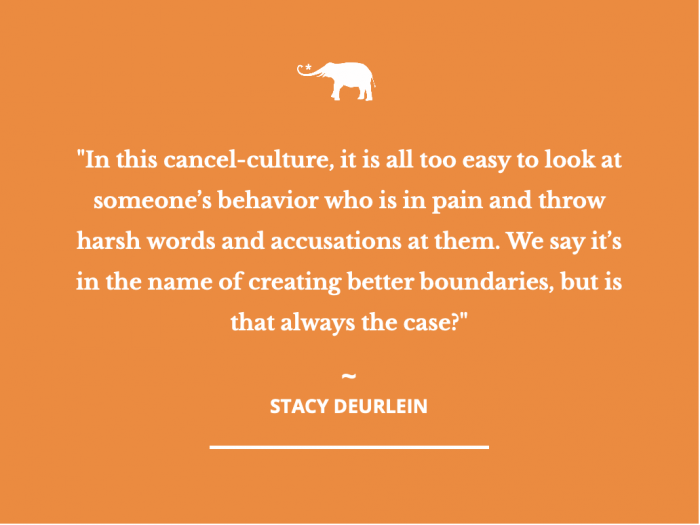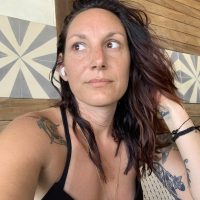I recently engaged back in the social media world after a year-long break.
I had come out of a four-week plant medicine retreat in Peru and was feeling a sense of empowerment and self-love, ready to start sharing with the world again. Oddly enough, the last article I wrote on Elephant Journal was only a few days before I left for that trip.
I had planned to spend months traveling, which only turned into six weeks. I came back feeling ready to play with life in a new way—one without crippling depression. I knew I still had work to do, but I truly thought the worst was behind me. As life would have it, the universe had other plans. It was like as soon as I thought I had overcome these darker parts of my being, the triggers flew at me like shrapnel and my armor wasn’t as strong as I thought.
As I re-engaged with the Instagram world, I came across post after post about the importance of cutting toxic people out of your life, becoming a higher vibrational being, a super manifestor—the list could go on. Maybe it should be inspiring (and some of it absolutely is), but to be honest, it is a bit bothersome and comes across to me as spiritual bypassing.
I have struggled with depression for as long as I can remember. My life may have looked okay and normal on the outside, but on the inside, I didn’t feel safe my entire childhood. As if suffering from difficult home life and depression wasn’t enough, a tragic accident happened in my family when I was 13 years old.
Now, PTSD was the breeding ground for depression, anxiety, and ADHD. Knowing what I know now and looking back on what must have been happening to my nervous system at such a young age, I try to meet myself with compassion instead of shame.
Yet sometimes it is hard. I am 34 years old and I see the trail of chaos that is behind me. Life undone often at my own hands. No life-long friends, no long-term career, often drifting from one place to another feeling like I can never get solid ground.
Though well educated and passionate, the mental and nervous system injures I am still working to heal have held me back in many areas of my life (a vulnerable thing to admit).
I have struggled with attachment issues, mainly in the realm of abandonment, causing me to be codependent in relationships. I have sabotaged things in my life—jobs, relationships, my own health, and well-being—simply because at a deep, deep level I am scared to let things be okay.
My nervous system goes on hyper-alert as soon as things get calm or dare I say, joyful. In the messiness of the human who I am, I have had labels thrown at me carelessly by people with whom I loved and allowed myself to be the most vulnerable. I have been told by an ex that I was narcissistic and borderline. I have been told by friends that I am “toxic” and “low vibrational.” It stings, and not because I sit in denial as if there aren’t some pieces of truth to these accusations, but these accusations are not all of who I am.
At my best, I am incredibly generous, kind, loving, and empathetic. I can wholeheartedly say I have never consciously manipulated someone or tried to cause them pain.
In this cancel-culture, it is all too easy to look at someone’s behavior who is in pain and throw harsh words and accusations at them. We say it’s in the name of creating better boundaries, but is that always the case? Or are we refusing to see the totality of who someone is underneath all of their pain? Are we unwilling to have the hard conversations with someone to try to reach a better understanding of one another before we throw up the brick wall and ride away on our high horse?
To be clear, I am not talking about physical and/or emotionally abusive relationships. I am talking about a person like me. A person who has been actively trying to heal from depression and C-PTSD for a number of years.
A person who loves people deeply. A person who wants to help people like her understand that their reactions to pain do not make them less of a human being. A person who doesn’t always get it right, and when they are triggered and in a depressive state, can need a lot of time before feeling better.
When people are suffering from any kind of physical disease or injury—cancer, an autoimmune condition, a broken bone— we don’t tell them that they are a problem. We don’t shame them.
With a mental injury like Complex post-traumatic stress disorder (C-PTSD), depression, and attention deficit hyperactivity disorder, or any other neurodivergent ailments, we are often not treated the same way. We are told that we are the problem. It’s often an invisible disease, and maybe that’s why those of us who suffer act out, perhaps so someone can see that we are injured and offer care and compassion.
Instead, people like me have judgment after judgment thrown at them, told to get over it, to choose something different, to do better.
I can tell you from doing work on myself, having an incredible therapist, and encountering the benefits of plant medicine that people like me are often trying their best. I sure as hell know I am.
We need compassion and understanding. We don’t need to be kicked when we are down. We are aware that we are a lot to handle, trust us, it’s a lot for us to handle. Gabor Mate famously wrote in his book, “In the Realm of Hungry Ghosts,” “Don’t ask why the addiction. Ask why the pain.”
The next time we are ready to label someone as toxic, let us take a moment to pause and consider that whatever “negative” behavior they are exhibiting is coming from a place of pain. If it’s truly best to remove that person from your life, do so with compassion.
Drop the judgment, drop the labels, drop the assumptions—they aren’t helping us heal.
~












Read 15 comments and reply